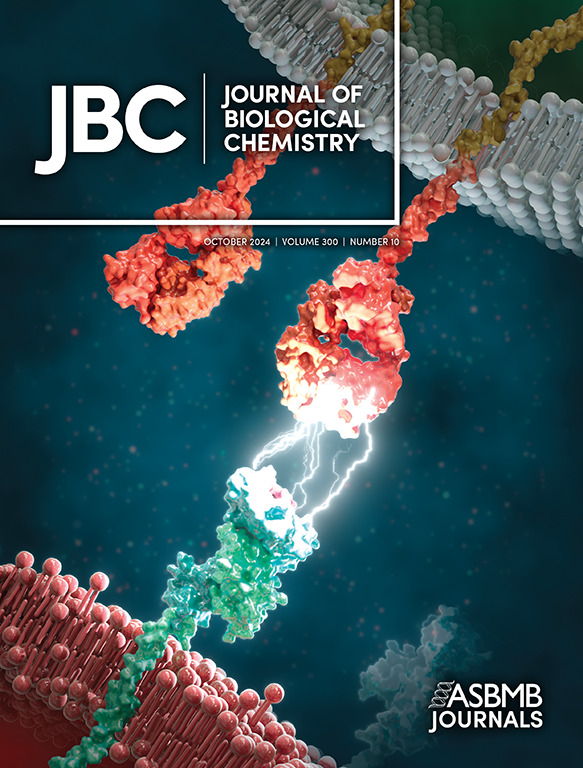Inhibition of anti-apoptotic BCL2 overcomes adaptive resistance to co-targeting of the protein kinase FAK and MEK in GNAQ-driven uveal melanoma.
IF 4
2区 生物学
Q2 BIOCHEMISTRY & MOLECULAR BIOLOGY
引用次数: 0
Abstract
Uveal melanoma (UVM) is the most common eye cancer in adults, with 50% of patients developing overt metastasis that often proves fatal. The majority of UVM harbor mutations in GNAQ or GNA11, encoding constitutively active Gαq proteins. Combined inhibition of MEK and FAK downstream of Gαq has shown promising effects in UVM cells by inducing apoptotic cell death, but resistance to this strategy can occur in the clinic. Here, we aimed to identify new targets to overcome resistance to MEK + FAK inhibition (FAKi+MEKi). Reverse-phase protein array (RPPA) analysis in UVM cells treated with FAKi+MEKi showed increased levels of pro-apoptotic proteins such as PUMA and BIM, which promoted cell death. However, we observed an adaptive increase in anti-apoptotic proteins, including BCL2, upon FAK+MEK blockade. We generated UVM cells resistant to FAKi+MEKi by prolonged exposure. Whole-exome sequencing did not reveal relevant acquired mutations; instead, resistant cells exhibit increased BCL2 levels. Moreover, expression of a stable BCL2 mutant confers resistance to both FAKi+MEKi and FAKi+"RAF-MEK clamp" (avutometinib) treatment. Of direct translational relevance, we found that an approved BCL2 inhibitor (venetoclax) displays synergistic efficacy with FAK+MEK blockade and overcomes acquired resistance, including when combined with darovasertib, a dual PKC/PKN inhibitor limiting MEK and FAK signaling that is under clinical evaluation. Our findings suggest that resistance to FAKi+MEKi in UVM cells can be driven by an adaptive upregulation of the anti-apoptotic protein BCL2, and that, in turn, BCL2 inhibitors represent a promising precision-targeted strategy to overcome FAKi+MEKi treatment resistance and improve therapeutic outcomes.在gnaq驱动的葡萄膜黑色素瘤中,抑制抗凋亡的BCL2克服了蛋白激酶FAK和MEK共同靶向的适应性抵抗。
葡萄膜黑色素瘤(UVM)是成人中最常见的眼癌,50%的患者发生明显的转移,通常是致命的。大多数UVM在GNAQ或GNA11中携带突变,编码构成活性的g - αq蛋白。联合抑制g - αq下游的MEK和FAK通过诱导凋亡细胞死亡在UVM细胞中显示出良好的效果,但在临床中可能出现对该策略的抗性。在这里,我们旨在确定新的靶点来克服对MEK + FAK抑制的耐药性(FAKi+MEKi)。FAKi+MEKi处理的UVM细胞的反相蛋白阵列(RPPA)分析显示,促凋亡蛋白如PUMA和BIM水平升高,促进细胞死亡。然而,我们观察到FAK+MEK阻断后抗凋亡蛋白(包括BCL2)的适应性增加。我们通过长时间暴露产生了对FAKi+MEKi耐药的UVM细胞。全外显子组测序未发现相关的获得性突变;相反,耐药细胞表现出BCL2水平升高。此外,稳定的BCL2突变体的表达对FAKi+MEKi和FAKi+“RAF-MEK钳夹”(avutometinib)治疗均具有抗性。与直接翻译相关的是,我们发现一种被批准的BCL2抑制剂(venetoclax)与FAK+MEK阻断剂表现出协同效应,并克服了获得性耐药,包括与darovasertib(一种限制MEK和FAK信号的PKC/PKN双重抑制剂,目前正在临床评估中)联合使用。我们的研究结果表明,UVM细胞对FAKi+MEKi的耐药性可能是由抗凋亡蛋白BCL2的适应性上调驱动的,反过来,BCL2抑制剂代表了一种有希望的精确靶向策略,可以克服FAKi+MEKi治疗耐药性并改善治疗结果。
本文章由计算机程序翻译,如有差异,请以英文原文为准。
求助全文
约1分钟内获得全文
求助全文
来源期刊

Journal of Biological Chemistry
Biochemistry, Genetics and Molecular Biology-Biochemistry
自引率
4.20%
发文量
1233
期刊介绍:
The Journal of Biological Chemistry welcomes high-quality science that seeks to elucidate the molecular and cellular basis of biological processes. Papers published in JBC can therefore fall under the umbrellas of not only biological chemistry, chemical biology, or biochemistry, but also allied disciplines such as biophysics, systems biology, RNA biology, immunology, microbiology, neurobiology, epigenetics, computational biology, ’omics, and many more. The outcome of our focus on papers that contribute novel and important mechanistic insights, rather than on a particular topic area, is that JBC is truly a melting pot for scientists across disciplines. In addition, JBC welcomes papers that describe methods that will help scientists push their biochemical inquiries forward and resources that will be of use to the research community.
 求助内容:
求助内容: 应助结果提醒方式:
应助结果提醒方式:


